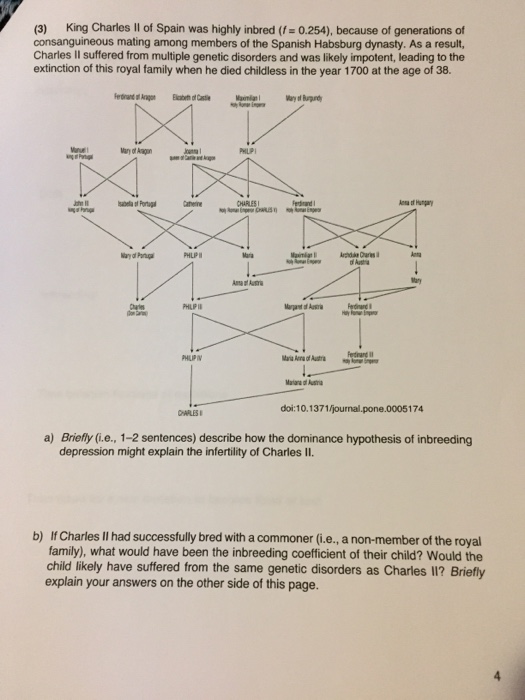Answered step by step
Verified Expert Solution
Question
1 Approved Answer
(3) King Charles II of Spain was highly inbred (f = 0.254), because of generations of consanguineous mating among members of the Spanish Habsburg

(3) King Charles II of Spain was highly inbred (f = 0.254), because of generations of consanguineous mating among members of the Spanish Habsburg dynasty. As a result, Charles Il suffered from multiple genetic disorders and was likely impotent, leading to the extinction of this royal family when he died childless in the year 1700 at the age of 38. Varu P JI Pange Ferdrandfa Mary of Ag of Portugal Mary of Portugal Cha Elcabeth of Castle Jonna l Cand PHLPI PHILIP PHILIPIN CHARLES Ma PHILIPI CHARLES C A Mara Way of Burgundy Ferdinand Maxim p Margant of Austria Mariana of Austra Mariana of Austria AC of Austr Ferdinand Hay m Ferdinand A Anta Mary doi:10.1371/journal.pone.0005174 a) Briefly (i.e., 1-2 sentences) describe how the dominance hypothesis of inbreeding depression might explain the infertility of Charles II. b) If Charles II had successfully bred with a commoner (i.e., a non-member of the royal family), what would have been the inbreeding coefficient of their child? Would the child likely have suffered from the same genetic disorders as Charles II? Briefly explain your answers on the other side of this page.
Step by Step Solution
★★★★★
3.41 Rating (151 Votes )
There are 3 Steps involved in it
Step: 1
A statistically significant inbreeding depression for survival to 10 years is detected in the progenies of the Spanish Habsburg kings The results indi...
Get Instant Access to Expert-Tailored Solutions
See step-by-step solutions with expert insights and AI powered tools for academic success
Step: 2

Step: 3

Ace Your Homework with AI
Get the answers you need in no time with our AI-driven, step-by-step assistance
Get Started


